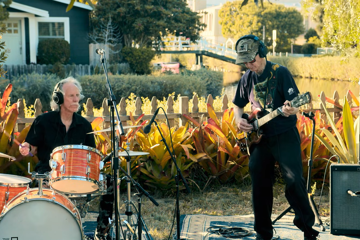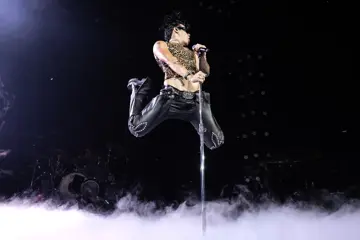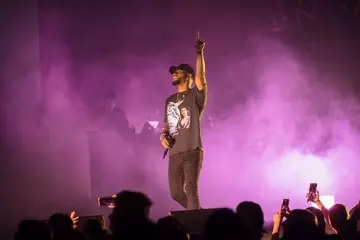 Kylie Minogue
Kylie MinogueFor someone who is so often praised as one of Australia's living national treasures, Logies punching bag Kylie Minogue is probably not feeling all that treasured today.
Last night's ceremony – Australian television's “night of nights” – hadn't even finished broadcasting before various commentators took to whatever platform they could to decry Minogue's performance of I Was Gonna Cancel. It would be redundant to re-list the tidal wave of smarmy comments here, but rest assured that everyone from Myf Warhurst to some nobodies from The Block made sure to put in their gleeful two cents over what they saw as the very embarrassing, very public floundering of one of pop music's most recognisable stars.
Hahaha we can't here what you've got to say after your performance Kylie cos your mic was off the whole time! #Logies #LipSincCity
— Dale and Sophie (@DaleandSophie) April 27, 2014
The sad part is: the critics were not exactly wrong.
Kylie's performance was lamentable, certainly. The argument over whether or not she was lip-syncing her way through it (which Team Kylie vehemently denies) is moot, as there are valid points propping up both sides in that dispute – from her vocal nuances differing substantially from publicly released recorded versions, to the proximity of her mouth to her microphone. That aside, even, it was still an abysmal display of unimaginative choreography, the sort of cookie-cutter Rock Eisteddfod shit that simply can't fly in a post-Pink world. Have you seen Pink's shows? Because goddamn it, Kylie. Be better.
Still, pointless quibbles over authenticity (and legitimate gripes at the piece's lack of imagination and generally flat vibe) aside, Kylie's not exactly a stranger to performance backlash – so if we criticise anything about Kylie's performance at the Logies, shouldn't it be, you know, that it happened at all?
Let's be frank for a second: Kylie Minogue is not anywhere near as relevant a celebrity here as she was even 10 or 15 years ago, and certainly not as far back as her days on Neighbours and those that immediately followed. This is not the same as saying she is irrelevant, but God knows if I go a fortnight without hearing the words “Kylie Minogue”, my world doesn't collapse in on itself.
Don't miss a beat with our FREE daily newsletter
Rather, Miss Minogue has been the de facto favourite long-serving pop daughter of Britain for, arguably, the majority of her career – and it was there where the shine started to fade once again on her perennially golden status: while there was considerable media interest when she signed on as a coach for the third series of The Voice UK, nobody expected that she would announce her impending departure before it had even finished airing.
Far from being the saviour of the fading British reality juggernaut, as it had been hoping so desperately would be the case, Kylie instead bailed and joined Australia's rotating cast of The Voice coaches, bringing with her fellow UK coach will.i.am – for whom the best marketing strategy with which Channel Nine can come up is having him recite his résumé for 30 seconds, like name-dropping all the people he's worked with qualifies him to sit in an oversize spinny chair. But I digress.
Her abrupt stint on The Voice UK is merely a symptom of a broader affliction – that maybe Kylie just doesn't resonate as well as she once did. Certainly, her most recent album, Kiss Me Once, peaked at No. 1 and No. 2 in Australia and Britain, respectively, but in the United States (aside from the US Dance/Electronic Albums chart, on which it hit No. 3) – a key future market for an act such as Kylie, especially given her relatively new business arrangement with Jay-Z's Roc Nation – its performance was less than stellar.
As if the pointed barbs and snarky witticisms over the Logies fiasco weren't enough, Kylie has also come under fire from within her own crews recently, with information surfacing last week that she had been involved in a controversy over an email callout for dancers to participate – for free – in filming the video for I Was Gonna Cancel, the same song at the centre of the Logies gossip factory.
As explained in Dance Chat Australia's excellent video wrap-up of the dispute – which saw #paythedancers gain considerable traction on Twitter – dancers received an email brief pertaining to the shoot, explaining: “As our budget is constrained, there will be no payment. However, we are looking to feature as many faces as possible. This will be a great opportunity for exposure.”
However, that was soon amended, according to one of the dancers involved. “Originally, it was offered as an unpaid gig, and then we all received a message from one of the organisers, saying that it would be $100 inclusive, for rehearsal and for the 10-hour shoot,” professional dancer Caetlyn Watson says in the video.
“We got paid cash on the day, but I haven't heard anything from production, none of the other cast members either; I haven't heard anything from anyone,” she adds later.
“And you'll also get the 'opportunity' to maybe dance with her at the Logies, to which I kindly said, 'No thanks, it's not something that I'm interested in,'” fellow dancer Samuel Gaskin offers, laughing at the prospect of dancing at the Logies while he's at it.
Kylie, for her part, denied suggestions that the dancers weren't paid, but, even if they were, $100 for more than 10 hours' work is more than a bit hard to stomach, especially when considering a performer of Kylie's calibre and presumed cash flow.
Unfortunately, Kylie would not be alone in stiffing such performers; this kind of thing is a growing problem in most creative arts.
The idea of an globally successful superstar with an annual salary of frickity-six million dollars paying an artist/writer/performer solely in “exposure” or “experience” is utterly absurd for myriad reasons, and the disturbing increase in anecdotes regarding the practice among the mind-blowingly wealthy in particular is something worth exploring in-depth another time.
Still, at the base of it all, the overarching theme of the story seems pretty clear: if you pay your dancers peanuts, you end up with that performance at the Logies – and nobody wins.















